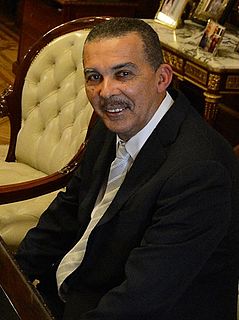A Quote by Harold Evans
Television and radio are what I call sequential media; they're not simultaneous media. With simultaneous media, you can scan your eye down an electronic or print page and pick among six or seven stories you might like and want to read. With television and radio, you have to wait until the guy's finished talking about the balloon boy, which I don't have the slightest interest in, to find out that all hell's broken loose in Baghdad. Because they've chosen that day to start with the balloon boy.
Quote Topics
Related Quotes
There's a joke about the balloon boy who has a balloon mum and a balloon dad and he goes to a balloon school with balloon friends ad a balloon principal. And one day, the balloon boy decides to take a pin to his balloon school, which is, of course, a disaster. And he's called into the balloon principal's office, and the balloon principal tells him, 'You've let me down, you've let your school down, you've let your parents down, you've let your friends down. But most importantly you've let yourself down'.
You can't just repurpose old material created for one platform, throw it up on another one, and then be surprised when everyone yawns in your face. No one would ever think it was a good idea to use a print ad for a television commercial, or confuse a banner ad for a radio spot. Like their traditional media platform cousins, every social media platform has its own language.
When my generation, those early days of television - I know I've been thinking about this lately - my two flashes of me as a little boy. One, I'm standing in front of the radio freaking out that Nat King Cole's singing 'Lady of Spain', just this stuff coming out of the radio, and Guy Williams singing 'Wild Horses' coming out of the radio.
There are no general-interest media that all of us can tap into. I'm not a good person to talk to about social media. I just avoid it. I'm suspicious also of the culture of venting. But the bigger question is, How can we in this media world have a genuine civic conversation? I mean, look at Franklin Roosevelt. He had these radio talks that all Americans listened to, and there was a common civic conversation that came out of it.
I have learned one thing, because I get treated very unfairly, that's what I call it, the fake media. And the fake media is not all of the media. You know some tried to say that the fake media was all the media, no. Sometimes they're fake, but the fake media is only some of the media. It bears no relationship to the truth.
The weird thing about serious acting is I've always done impressions of people, all my life, and I did the thing called a balloon debate. The idea is there's a hot air balloon traveling across the Atlantic and it's going down and you have to give a speech as to why you should stay in the balloon. Six people are going to be chucked out and you want to stay.

































